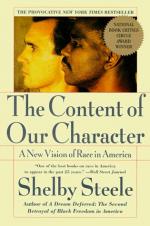|
This section contains 335 words (approx. 1 page at 400 words per page) |

|
Chapter 7, Affirmative Action, The Price of Preference Summary and Analysis
When Steele's children apply to college, he faces a dilemma. While he opposes affirmative action, he could benefit his children by appealing to it. Somehow affirmative action seemed fair, though in another sense it obviously is not. Affirmative action initially looks fair because it looks like compensation for past harms. Yet a major problem with the program is that it has transformed equality into a form of social engineering in order to change white attitudes and increase campus diversity.
In one way, affirmative action is a kind of exchange between blacks and whites. Whites get absolved from racial guilt and blacks get power. Yet the exchange is a barrier to black advancement. Campuses focus on diversity rather than development and blacks are demoralized by the message that they need...
(read more from the Chapter 7, Affirmative Action, The Price of Preference Summary)
|
This section contains 335 words (approx. 1 page at 400 words per page) |

|




